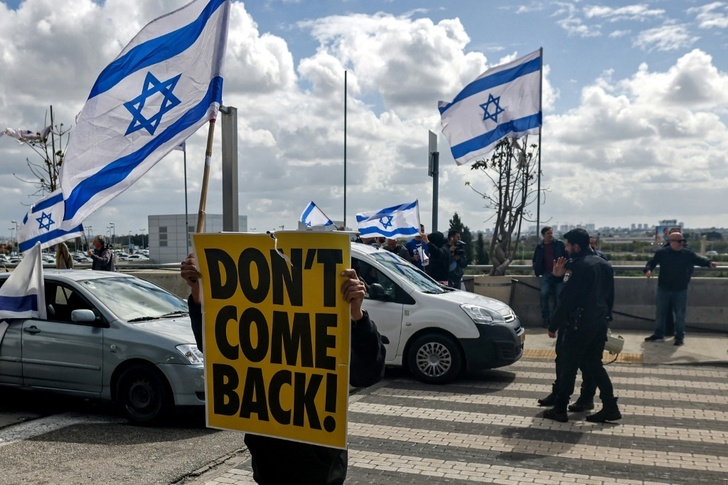Israeli Prime Minister Benjamin Netanyahu was on Thursday to meet Germany's leaders, who are expected to urge him to reconsider disputed legal reforms that have prompted Israel's president to warn of the threat of "civil war".
German President Frank-Walter Steinmeier, speaking in Tallinn on the eve of Netanyahu's visit, said he planned to raise the reforms with the Israeli prime minister when they meet later Thursday.
Israel is the "only democracy in the whole region, a country with a strong constitutional state", he said. "What I would like to see is that what we have admired about Israel... is preserved."
Netanyahu's government, which includes ultra-Orthodox and extreme-right parties, introduced its highly controversial judicial reform package in January.
It has argued the reforms are needed to limit judicial overreach, but protesters have decried them as threatening Israel's liberal democracy by weakening key checks and balances.
Ten consecutive weeks of nationwide demonstrations have followed, with critics also charging that the proposed changes aim to protect Netanyahu as he fights corruption charges in an ongoing court battle.
"Anyone who thinks that a genuine civil war, with human lives, is a line that we could never reach, has no idea what he is talking about," warned Israel's President Isaac Herzog late Wednesday.
"It is precisely now, in the State of Israel's 75th year of independence, that the abyss is within touching distance. Today, I say to you what I told them: civil war is a red line. I will not allow it to happen," he said, adding that he was convinced that the majority of Israelis want a compromise.
The disputed changes proposed by the coalition would allow lawmakers to override Supreme Court decisions that strike down legislation with a parliamentary majority, and then deny the court the right to review such a move.
It would also make it harder for the Supreme Court to strike down legislation it deems to contravene Basic Laws, Israel's quasi constitution.
Herzog, who holds a largely ceremonial role, has for weeks been toiling over a proposal to soften the government's legal overhaul.
- Corruption charges -
Netanyahu, speaking before boarding his plane to Germany, said Iran would be the "main issue" of his discussions, along with "other topics important to Israel".
"The security issues don't pause, even for a moment," he added at Ben Gurion airport, where protesters had gathered, holding up placards reading "Dictator on the run" and "Don't come back".
Protests have been called too by Israelis living in Germany, including a demonstration at the Brandenburg Gate on Thursday.
Besides meeting Steinmeier, Netanyahu will hold separate talks with Chancellor Olaf Scholz.
The Israeli prime minister and Scholz will also visit the Platform 17 memorial which commemorates the thousands of Jews who were deported from Berlin by Nazi Germany.
The controversy in Israel puts Germany in an uncomfortable position.
Germany and Israel forged strong diplomatic ties in the decades after World War II, with Berlin committed to the preservation of the Israeli state in penance for the Holocaust.
Successive German governments have described Israel's national security as a crucial foreign policy priority.
Government spokesman Steffen Hebestreit on Monday said Netanyahu is the "elected prime minister of Israel and therefore also a normal guest in Germany".
jjm-hmn/sr/jmm
© Agence France-Presse
Your content is great. However, if any of the content contained herein violates any rights of yours, including those of copyright, please contact us immediately by e-mail at media[@]kissrpr.com.
Source: Story.KISSPR.com

